初中英语形容词与副词总复习
初中的归纳常见的形容词与副词的用法总结
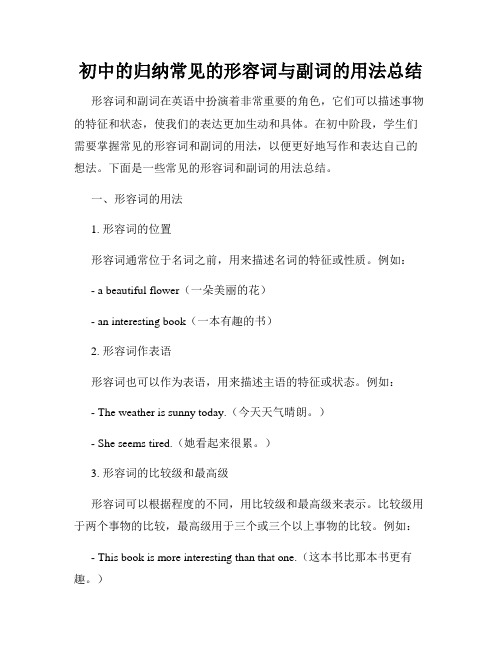
初中的归纳常见的形容词与副词的用法总结形容词和副词在英语中扮演着非常重要的角色,它们可以描述事物的特征和状态,使我们的表达更加生动和具体。
在初中阶段,学生们需要掌握常见的形容词和副词的用法,以便更好地写作和表达自己的想法。
下面是一些常见的形容词和副词的用法总结。
一、形容词的用法1. 形容词的位置形容词通常位于名词之前,用来描述名词的特征或性质。
例如:- a beautiful flower(一朵美丽的花)- an interesting book(一本有趣的书)2. 形容词作表语形容词也可以作为表语,用来描述主语的特征或状态。
例如:- The weather is sunny today.(今天天气晴朗。
)- She seems tired.(她看起来很累。
)3. 形容词的比较级和最高级形容词可以根据程度的不同,用比较级和最高级来表示。
比较级用于两个事物的比较,最高级用于三个或三个以上事物的比较。
例如:- This book is more interesting than that one.(这本书比那本书更有趣。
)- English is the most widely spoken language in the world.(英语是世界上使用最广泛的语言。
)二、副词的用法1. 副词的位置副词通常位于动词之前,用来修饰动作的方式、程度或频率。
例如:- He runs fast.(他跑得快。
)- She speaks English fluently.(她流利地讲英语。
)2. 副词作状语副词可以作为状语,用来描述动词、形容词或其他副词的方式、程度或频率。
例如:- He sings loudly.(他大声唱歌。
)- The car is too expensive.(这辆车太贵了。
)3. 副词的比较级和最高级副词的比较级和最高级的形式和用法与形容词类似。
例如:- She runs faster than her brother.(她跑得比她哥哥快。
初一英语形容词和副词语法知识总结(讲解+考点+综合练习):形容词和副词
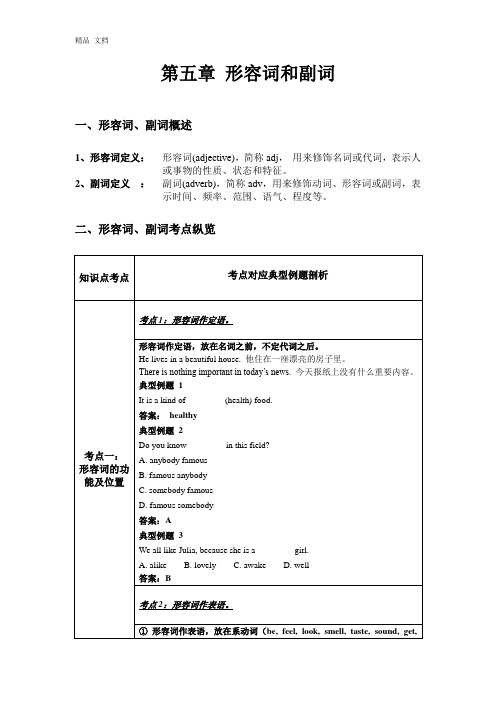
第五章形容词和副词一、形容词、副词概述1、形容词定义:形容词(adjective),简称adj,用来修饰名词或代词,表示人或事物的性质、状态和特征。
2、副词定义:副词(adverb),简称adv,用来修饰动词、形容词或副词,表示时间、频率、范围、语气、程度等。
二、形容词、副词考点纵览三、综合练习( )1. –If you don’t like the red coat, how about the green one?–OK, but do you have _______ size in green? This one is a bit small for me.A. a bigB. a biggerC. the bigD. the bigger( )2. –Mum, I think I’m _______ to get back to school.–Not really, my dear. You’d better stay at home for anoth er day or two.A. so wellB. so goodC. well enoughD. good enough ( )3. –What delicious cakes! –They will taste _______ with butter.A. goodB. betterC. badD. worse( )4. –Mr. Zhou , of all the students in our group, who lives _______ ?–I think Li Lei does.A. farB. fartherC. farthestD. the farther( )5. With a history of more than 1,400 years, ZhaoZhou Bridge is the _______ stone arch bridge in the world .A. oldB. olderC. oldestD. elder( )6. Bob never does him homework _______ Mary. He makes lots of mistakes.A. so careful asB. as carefully asC. carefully asD. as careful as ( )7. A: How can I speak English _______ you?B: You’d better speak more, I think.A. as good asB. more thanC. as well asD. as much as( )8. Your English is good. I’ll try my best to speak it as _______you do.A. clearly asB. clear asC. clearer thanD. more clearly ( )9. –Is your mother badly ill?–No, _______ , only a little cold.A. serious anythingB. serious nothingC. nothing seriousD. anything serious( )10. I’m not sure if I’m going to Tim’s party; I may go to the concert _______ .A. onlyB. insteadC. earlyD. late( )11. Although they are brothers, they are the _______ opposite of one another.A. veryB. justC. fewD. little( )12. The new Bright Restaurant is _______ than the old one. Moore and more people like to eat there.A. goodB. betterC. badD. worse( )13. Wang Ping does _______ in physics that I missed the first class.A. badlyB. Most badlyC. worseD. worst( )14. I got up so _______ this morning that I missed the first class.A. earlyB. lateC. quietlyD. neatly( )15. –Do you enjoy traveling by plane?–No. It’s _______ expensive.A. much moreB. more muchC. too muchD. much too( )16. I’m afraid the headmaster is _______ busy to meet the visitors.A. too muchB. much tooC. so muchD. much too( )17. How beautifully she sings! I’ve never heard _______ .A. the better voiceB. a good voiceC. the best voiceD. a better voice( )18. You do well in your lessons. I’m _______ you will pass the exam.A. sureB. afraidC. sadD. sorry( )19. –Who is _______ in your class?–Fred.A. tallB. tallerC. tallestD. the tallest( )20. –What do you think of the football match?–Wonderful! The Chinese football team has never played _______ .A. betterB. bestC. worseD. worst( )21. The population of China is _____ than _____ of any other country in the world.A. larger , the oneB. more , thatC. larger , thatD. more , the one ( )22. There is much wine here, but _______ people want to drink it.A. manyB. a littleC. fewD. a few( )23. People speak ______ of the film Not One Less. It is really necessary for every child to go to school.A. loudB. loudlyC. highD. highly( )24. She always finishes her homework on time. She ______ leaves it for tomorrow.A. alwaysB. neverC. usuallyD. sometimes( )25. The football match was _______, so the boys were _______ about it.A. excited , excitingB. exciting, excitedC. excited , excitedD. exciting , exciting( )26. Playing table tennis isn’t difficult. You can learn it _______.A. easyB. easilyC. quickD. hardly( )27. We Chinese always put our family name _______.A. lastB. nearlyC. firstD. in the middle ( )28. This kind of T-shirt look _______ and sells _______ in the market.A. nice, goodB. well , wellC. nice , wellD. good , nice( )29. The light in the room wasn’t _______ for me to read.A. brightly enoughB. enough brightlyC. enough brightD. bright enough( )30. –Look, this digital camera is really cheap! It’s only five hundred yuan.–The _______ , the better. I’m short _______ money, you know.A. cheaper , ofB. cheap, forC. expensive , ofD. more expensive , for( )31. Which subject do you like _______ , math, Chinese or English?A. betterB. bestC. wellD. very much( )32. _______ little water is not enough for _______ many people.A. Such , soB. So , soC. Such , suchD. So , such( )33. English is spoken by _______ people.A. a lotB. much manyC. a large number ofD. a great deal of ( )34. –Isn’t that Mary?–Yes, she always has a(an) _______ smile on her face.A. aloneB. kindlyC. ownD. friendly( )35. –Do you prefer music to drawing?–No. I like drawing _______.A. wellB. mostC. betterD. best( )36. Since China has been a member of the WTO, English is ______ useful than before.A. moreB. mostC. muchD. very( )37. Can you speak a little louder? I can _______ hear you.A. hardB. reallyC. hardlyD. clearly( )38. China has a _______ population and long history.A. manyB. largeC. muchD. big( )39. Do you have _______ to say?A. important anythingB. anything importantC. important somethingD. something important( )40. Which is _______ , English or Chinese?A. interestingB. interestingerC. more interestingD. most interesting( )41. –The TV programme is boring. Shall we play chess intead?–All right. That is _______ than watching a boring programme.A. very goodB. much goodC. very betterD. much better( )42. –Mum, could you buy me a dress like this?–Certainly, we can buy _______ one than this, but _______ this.A. a better, better thanB. a worse , as good asC. a cheaper , as good asD. a more important , not as good as ( )43. Let’s enjoy the song Yesterday Once More. It sounds _______.A. wellB. sadlyC. niceD. bad( )44. –Is the physics problem _______ ?–Yes. I can work it out _______.A. easy , easilyB. easy, easyC. easily , easyD. easily , easily ( )45. Hainan is a very large island. It’s the second _______ island in China.A. largeB. largerC. largerD. most large( )46. What a _______ cough! You seem _______ ill.A. terrible, terriblyB. terribly , terribleC. terrible , terribleD. terribly , terribly ( )47. I’m not sure whether Mary can sing _______ Mabel.A. as well asB. as good asC. so good asD. as better as( )48. Chinese is _______ more difficult than English.A. mostB. veryC. manyD. much( )49. The _______ old man told his son to be a good boy.A. diedB. deadC. dyingD. death( )50. Today my sister is feeling _______ to go to the factory.A. enough goodB. good enoughC. well enoughD. enough well参考答案精品文档1—5 B C B C C6—10 B C A C B11—15 A B D B D16—20 B D A D A21—25 C C D B B26—30 B C C D A31—35 B B C D C36—40 A C B B C文档说明(Word文档可以删除编辑)专注于精品文档:中考、高考、数学语文英语试卷、高中复习题目、小学试卷教案合同协议施工组织设计、期中、期末等测试,本文档目的是为了节省读者的工作时间,提高读者的工作效率,读者可以放心下载文档进行编辑使用.文档来源网络改编,审核有可能疏忽,如果有错误或侵权,请联系本店马上删除。
初中英语知识点总结形容词副词知识点总结

初中英语知识点总结:形容词副词知识点总结形容词用于修饰名词和代词,表示人和事物的性质和特征。
副词既可修饰动词,又可修饰形容词,其它副词,甚至整个句子。
(一)形容词和副词级的变化:大多数的形容词、副词都有三个等级:原级:比较级:比较...,更...一些最高级:最...、一般构成规律:一般单音节词,直接加以结尾的词,加以单个辅音字母(非)结尾的单音节词,双写末尾的辅音字母,再加以辅音字母结尾的双音节词,变为,再加多数多音节词和源于分词的形容词,在原级前加、常见的不规则变化:原级比较级最高级、常见的比较级和最高级的基本句型及其用法:原级的用法:①肯定句型:形容词(副词)原级…意思是“与……一样”.这个男孩和他的哥哥一样聪明。
.露茜写得和莉莉一样认真。
②否定句型:形容词(副词)原级…意思是“不如……“.猴子不如大象强壮。
.他没有你好。
比较级的用法:、比较级.彼得比山姆聪明。
.这来辆车比那一辆漂亮。
、形容词比较级前可用等修饰。
.彼得比山姆聪明的多。
.这间房子比那间稍微亮一点。
、比较级比较级意思是“越来越…...”.雨下得越来越大。
、比较级,比较级意思是“越…...就越…...”.你学习越努力,进步就越快。
、比较级单数名词.意思是“比其它的任何一个……都更……”(这种情况其实是用比较级的形式表达最高级的意思。
).在他班里他比其它任何学生都更愚蠢。
.她比队里的其余任何一个女孩都要高。
最高级的用法:、有范围修饰的用最高级,如或用从句修饰的句子中。
.在所有这些表中这块最贵。
、序数词最高级名词表示“第几个最……的”.黄河是中国的第二大河流。
.这个公园是北京第三大公园。
、最高级复数名词表示“是最……之一”.美国是世界上最富有的国家之一。
.北京最美丽的地方之一是颐和园。
、形容词最高级前一定要用,而副词最高级前可省略。
.大象是这个动物园里最重的动物。
() .所有学生中她来得最早。
(二)、常用副词在句中的位置:、时间副词、地点副词和方式副词一般置于句末。
中考英语形容词和副词用法总结
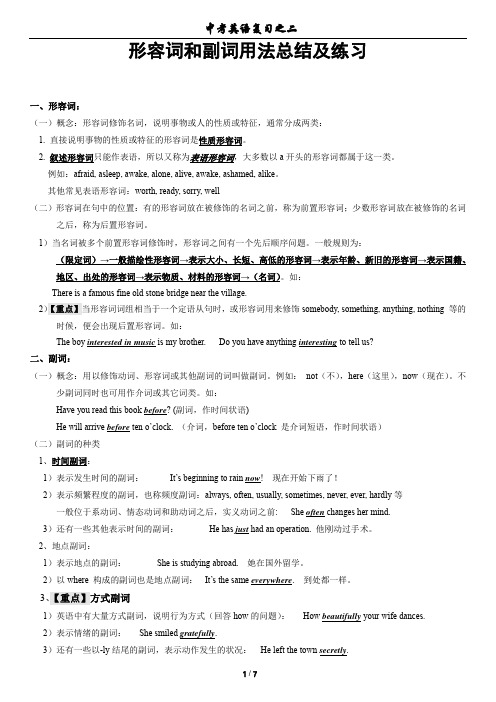
形容词和副词用法总结及练习一、形容词:(一)概念:形容词修饰名词,说明事物或人的性质或特征,通常分成两类:1. 直接说明事物的性质或特征的形容词是性质形容词。
2. 叙述形容词只能作表语,所以又称为表语形容词,大多数以a开头的形容词都属于这一类。
例如:afraid, asleep, awake, alone, alive, awake, ashamed, alike。
其他常见表语形容词:worth, ready, sorry, well(二)形容词在句中的位置:有的形容词放在被修饰的名词之前,称为前置形容词;少数形容词放在被修饰的名词之后,称为后置形容词。
1)当名词被多个前置形容词修饰时,形容词之间有一个先后顺序问题。
一般规则为:(限定词)→一般描绘性形容词→表示大小、长短、高低的形容词→表示年龄、新旧的形容词→表示国籍、地区、出处的形容词→表示物质、材料的形容词→(名词)。
如:There is a famous fine old stone bridge near the village.2)【重点】当形容词词组相当于一个定语从句时,或形容词用来修饰somebody, something, anything, nothing 等的时候,便会出现后置形容词。
如:The boy interested in music is my brother. Do you have anything interesting to tell us?二、副词:(一)概念:用以修饰动词、形容词或其他副词的词叫做副词。
例如:not(不),here(这里),now(现在)。
不少副词同时也可用作介词或其它词类。
如:Have you read this book before? (副词,作时间状语)He will arrive before ten o’clock. (介词,before ten o’clock 是介词短语,作时间状语)(二)副词的种类1、时间副词:1)表示发生时间的副词:It’s beginning to rain now! 现在开始下雨了!2)表示频繁程度的副词,也称频度副词:always, often, usually, sometimes, never, ever, hardly等一般位于系动词、情态动词和助动词之后,实义动词之前: She often changes her mind.3)还有一些其他表示时间的副词:He has just had an operation. 他刚动过手术。
中考英语形容词,副词知识点
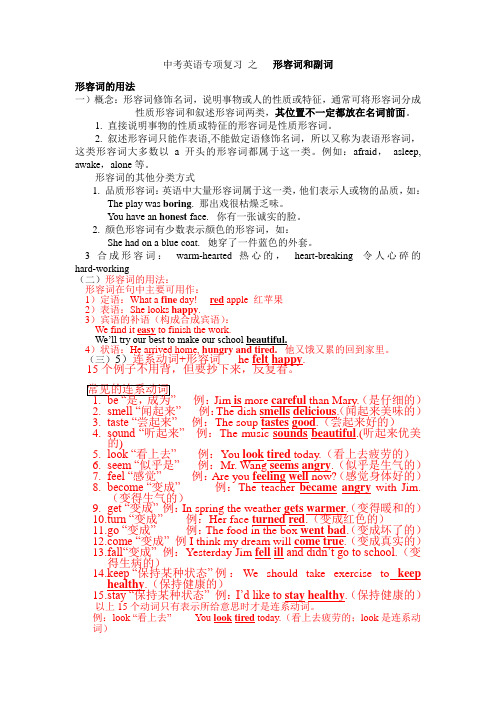
中考英语专项复习之形容词和副词形容词的用法一)概念:形容词修饰名词,说明事物或人的性质或特征,通常可将形容词分成性质形容词和叙述形容词两类,其位置不一定都放在名词前面。
1. 直接说明事物的性质或特征的形容词是性质形容词。
2. 叙述形容词只能作表语,不能做定语修饰名词,所以又称为表语形容词,这类形容词大多数以a开头的形容词都属于这一类。
例如:afraid,asleep, awake,alone等。
形容词的其他分类方式1. 品质形容词:英语中大量形容词属于这一类,他们表示人或物的品质,如:The play was boring. 那出戏很枯燥乏味。
You have an honest face. 你有一张诚实的脸。
2. 颜色形容词有少数表示颜色的形容词,如:She had on a blue coat. 她穿了一件蓝色的外套。
3 合成形容词:warm-hearted 热心的,heart-breaking 令人心碎的hard-working(二)形容词的用法:形容词在句中主要可用作:1)定语:What a fine day! red apple 红苹果2)表语:She looks happy.3)宾语的补语(构成合成宾语):We find it easy to finish the work.We’ll try our best to make our school beautiful.4)状语:He arrived home, hungry and tired.他又饿又累的回到家里。
(三)5)连系动词+形容词he felt happy.15个例子不用背,但要抄下来,反复看。
例:Jim is more careful than Mary.(是仔细的)2.smell “闻起来”例:The dish smells delicious.(闻起来美味的)3.taste “尝起来”例:The soup tastes good.(尝起来好的)4.sound “听起来”例:The music sounds beautiful.(听起来优美的)5.look “看上去”例:You look tired today.(看上去疲劳的)6.seem “似乎是”例:Mr. Wang seems angry.(似乎是生气的)7.feel “感觉”例:Are you feeling well now?(感觉身体好的)8.become “变成”例:The teacher became angry with Jim.(变得生气的)9.get “变成”例:In spring the weather gets warmer.(变得暖和的)10.t urn “变成”例:Her face turned red.(变成红色的)11.g o “变成” 例:The food in the box went bad.(变成坏了的)12.c ome “变成”例I think my dream will come true.(变成真实的)13.f all“变成”例:Yesterday Jim fell ill and didn’t go to school.(变得生病的)14.k eep “保持某种状态”例:We should take exercise to keephealthy.(保持健康的)15.s tay “保持某种状态”例:I’d like to stay healthy.(保持健康的)以上15个动词只有表示所给意思时才是连系动词。
中考英语形容词副词复习
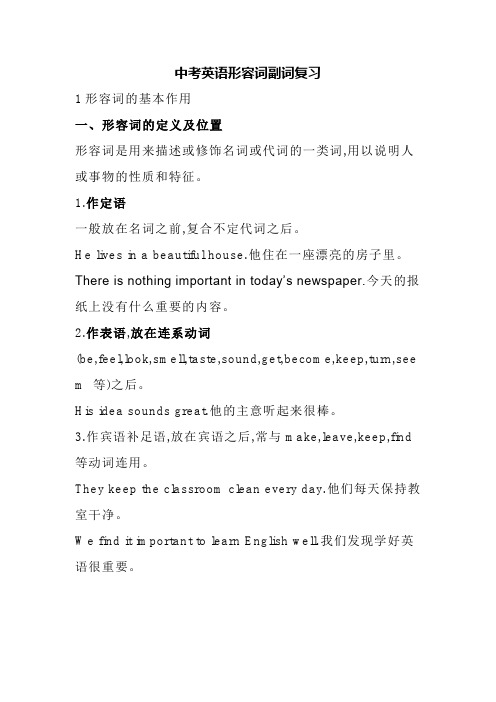
中考英语形容词副词复习1形容词的基本作用一、形容词的定义及位置形容词是用来描述或修饰名词或代词的一类词,用以说明人或事物的性质和特征。
1.作定语一般放在名词之前,复合不定代词之后。
He lives in a beautiful house.他住在一座漂亮的房子里。
There is nothing important in today’s newspaper.今天的报纸上没有什么重要的内容。
2.作表语,放在连系动词(be,feel,look,smell,taste,sound,get,become,keep,turn,see m 等)之后。
His idea sounds great.他的主意听起来很棒。
3.作宾语补足语,放在宾语之后,常与make,leave,keep,find 等动词连用。
They keep the classroom clean every day.他们每天保持教室干净。
We find it important to learn English well.我们发现学好英语很重要。
4.形容词的名词化有些形容词放在定冠词之后变成名词,表示一类人,常见的有:good/bad,rich/poor,young/old,deaf/blind,black/white,livi ng/dead等The old should be taken good care of.老年人应该受到很好的照顾。
2形容词词义辨析中考主要在完形中考查形容词词义辨析。
学生在做辨析题时,首先应读懂句意,抓住题干中关键信息,并分析各选项表达的意思,结合日常生活的常识及语境即可选出正确答案。
如:After the football match, the players were very ______ and tired.A. cool B. full C. lively D. thirsty方法点拨第1步:分析四个选项均为形容词,在句中作表语;第2步:分析语境“在足球比赛之后,运动员是_____和疲劳的。
中考英语形容词-副词复习
形容词的构成通常有:
1、+ful
forget—forgetful
help—helpful
wonder—wonderful use—useful
care—careful
beauty—beautiful
thank-thankful
colour ----colourful
farther/further farthest/furthest older/elder oldest/eldest
as+形容词原形+as
Tom is as tall as Mike.
There are as many students in our
school as yours.
否定 not as+形容词原形+as “和… 不一样”
注意:
中考英语专项复习 形容词和副词
①最高级前可以有序数词来修饰。例如:
Which is the first most useful
invention? 哪一个是第一个最有用途的发明?
②如果形容词最高级前有物主代词,指示代 词,名词所有格时,则不必加定冠词the。 例如:
Yesterday was my busiest day. 昨天是 我最忙碌的一天。
Which is easier, maths or English? 3、能修饰比较级的副词及短:much(…的多)、 a lot(…的多)、even(更…)、still(更…)、a bit/alittle(…一点儿)
This city is much more beautiful than
hat one
明确这两种词的基本意义以及在语句中的功能和 位置, 如形容词具有修饰和限定作用,一般用来 修饰名词,在语句中可用作定语和表语;
初中英语语法---形容词和副词含练习
专题复习---形容词和副词〔一〕一、形容词的构成及其用法用以修饰名词等表示人和事物的性质、特征的词叫形容词。
它在句中可以充当定语、表语和宾语补足语,一般放在所修饰词的前面。
Eg. Those big moon cakes are delicious. (作表语)Eg. There are many beautiful flowers in the park. (作定语)1.修饰词尾为-body/-one; -thing不定代词时,必须放在其后。
Eg. There’s nothing wrong with my bike.Eg. Please give me something delicious to eat.Eg. Anybody clever can’t do such stupid things.2.表示长、宽、高、深或年龄的形容词的常用构造:数词+名词+形容词12 years old/ 8meters long/ 3 meters wide/ 100 kilometers high/ 1.8meters tallEg. It’s a river 6 meters deep.Eg. That’s a road 300 kilometers long.Eg. The young man is 1.8 meters tall.3.系动词〔look, sound, smell, taste, feel〕之后要接形容词Eg. The soup tastes nice.Eg. They all looked very happy after hearing the good news.4.–ing形容词和-ed形容词的区别-ed形容词通常用来形容人,而-ing形容词通常用来形容事或物如:disappointed/e*cited/interested/surprised/bored/amazed/rela*ed (*人)感到失望/兴奋/有趣/奇怪/厌烦/震惊/放松disappointing/e*citing/interesting/surprising/boring/amazing /rela*ing〔*事〕令人失望的/兴奋的/有趣的/奇怪的/厌烦的/震惊的/放松的5.“the +局部形容词〞表示“一类人〞the young the old the rich the poor二、副词的构成和用法。
中考英语形容词与副词复习
中考英语形容词与副词复习篇一:2016年中考英语复习之形容词(副词)2016年中考英语复习之形容词(副词)一、形容词/副词的用法 1.用来修饰名词作定语;2.位于主系表结构中作表语;(常见的系动词有:一是一感一保持, 起来四个好像变了三。
)be,feel,stay,keep,look,smell,taste,sound,seem,turn,bee ,get3.有的形容词只能做表语(lonely,afraid,asleep,awake,alive)4.做宾语补足语,对句子的宾语进行补充说明 We should keep our classroom clean.5.副词用来修饰动词或形容词。
二、常见名词变形容词的方法:在名词后加上(表示天气的)y,(表示方位的)ern,(表示称谓的)ly,(表示物质的)en,(表示抽象意义的)ful/less,(表示大洲与国家的)ncloudy,windy,rainy,sunny,foggy,icy,wertern,eastern,sou thern,northern,friendly,motherly,weekly,daily,wooden,g olden,careful,useful,wonderful,colorful,hopeful,succes sful,lucky,hopeless,useless,careless,Asian,American三、表示情感的表语形容词后可接不定式be+glad/happy.pleased/sorrry,sad/sure/kind/ready/afrai d/able/easy/difficult+to do sth四、形容词(副词)比较级、最高级的构成(一)以er,ow,ble,ple,y结尾的双音节词和单音节词:①一般在词尾直接加er或est; ②以不发音的e结尾的, 在词尾加r 或st;③以“辅音字母+y”结尾,先把y变为i,再加er或est; ④.以重读闭音节结尾,且末尾只有一个辅音字母的,双写末尾的辅音字母,再加er/est.fat,thin,sad,hot,big,red,wet.(二)末尾不是以er,ow,ble,ple,y结尾的双音节词和所有多音节词直接在单词前加more/most; (三)以-ly结尾的副词和以-ing/-ed结尾的形容词直接在单词前加more/most; (四)不规则变化(good/well,many/much,bad/badly/ill,little,far,old)good/well-better-best many/much-more/most little-less-leastbad/badly/ill-worse-worst far-farther/further-farthest/furthest old-older/elder-oldest/eldest五、形容词/副词原级的用法1.可以用quite,very,so,too,enough修饰原级;2. as+原级+as3. not+as/so+原级+as4.甲是乙的几倍(甲+is+倍数+as…as+乙)This bridge is three times as long as that one. Your room is twice as large as mine.六、形容词/副词比较级的用法 1.than是比较级的标志词2.句中出现两个比较对象或含两个人/物时,用比较级;3. much,far,even,a little,a lot,a bit常用于比较级之前;4.Which/Who+比较级,A or B?5.甲+be+the+比较级+of the two(甲是两者中较…的)6.甲+be+比较级+than+any other+单数名词(甲比其它的任何一个都…)7.倍数+比较级+than(表示几倍于) This classroom is two times bigger than that one. 8.比较级+and+比较级(越来越…)a.单音节词和以er,ow,ble,ple,y结尾的双音节词:比较级+and+比较级 b.部分双音节词和多音节词:more and more+多音节词原形 9.the+比较级……,the+比较级……(越……,就越……)七、形容词/副词最高级的用法 1.the 是最高级的标志词;2.句中出现≥3个比较对象时,用最高级;3.句中出现of all,of the three,that I have ever seen 时,用最高级;4.Which/Who+is+the+最高级,甲、乙or 丙?5.表示最……之一,要用“one of+the+形容词最高级+复数名词+表示范围的介词短语”6.序数词后的形容词一般要用最高级(表示第几最……) The Yello w River is the second longest river in China.7.形容词最高级前一般要加the,但若最高级前出现了形容词性物主代词或名词所有格形式,则不再用the.8.副词最高级前一般不用定冠词the.翻译下列短语和句子:1.越来越胖2.越来越漂亮3.越来越热4.越来越无聊5.越来越瘦6.越来越高兴7.越来越生气8.越来越饿9.越来越伤心10.越来越冷 11.越来越大12.越来越粗心 13.越来越早 14.越来越多15.越来越好 16.越来越危险17.越来越少18.越来越疲惫19.你越认真,你犯的错误就越少。
九年级中考英语专题复习之形容词副词
A. someone else B. someone else’ C. else someone D. Someone’ else
Let’s fill in the blanks
词 尾 变 化taller h原ar级tdaellrest 比ha较rde最st高
and laughed ___A___
A. happily B. happy C. happier D. happiest
4. In our city, it is D____ in July ,but it is
even ____ in August.
A. hotter hottest B. hot hot
(1).最高级 ,A, B or C? “哪个最……?” Who is the youngest, ZhuangXin, Zhuangkai or ZhuangKe?
(2)…the+最高级+of /in 短语…
Zhuangshun is the heaviest boy in our class. YingLuxi writes the most carefully of us three.
The Yellow River is the second longest river in China.
1. The bread is __C__ than these cakes
A. very delicious B. much delicious C. more delicious D. as delicious
或以或多e-辅音ess音节tt 字词母和多+y数结双尾音的节词词变在为其i再前加面mmm-eooor,rrrhedeeeaaifrpfdpsmmlipycloiyuofoolpfdtwssiructtylulypsallrtoopwullyar
- 1、下载文档前请自行甄别文档内容的完整性,平台不提供额外的编辑、内容补充、找答案等附加服务。
- 2、"仅部分预览"的文档,不可在线预览部分如存在完整性等问题,可反馈申请退款(可完整预览的文档不适用该条件!)。
- 3、如文档侵犯您的权益,请联系客服反馈,我们会尽快为您处理(人工客服工作时间:9:00-18:30)。
初中英语形容词与副词总复习————————————————————————————————作者: ————————————————————————————————日期:形容词、副词用法专题精讲Ⅰ形容词一、形容词的一般用法1.作定语,一般放在所修饰词的前面。
例如,It’s a cold and windyday.2.作表语,放在系动词的后面。
例如,He looks happy today.3.形容词修饰something,anything,nothing,everything等复合不定代词时,须放在其后。
例如,Would you like something hotto drink?4.表示长、宽、高、深及年龄的形容词,应放在相应的名词之后。
例如,Howlong is the river?Its abouttwo hundred metres long.5.只能作表语的形容词:afraid害怕;alone独自的;asleep睡着的;awake醒着的;alive活着的;well健康的;ill病的;frightened害怕的例如,The man is ill.(正) The ill man is my uncle.(误)6.只能作定语的形容词:little小的;only唯一的;wooden木质的;woolen羊毛质的;elder年长的例如,Myelder brother is in Beijing.(正) My brother is elder. (误)7.貌似副词的形容词:lonely独自的;friendly友好的;lively生动的;lovely可爱的8.复合形容词:snow-white雪白的English-speaking说英语的;glass-topped玻璃罩的;full-time全日制的;well-known众所周知的;kind-hearted善良的;man-made人造的;take-away可以带走的;ten-year-old十岁的。
二、多个形容词修饰名词时,其顺序为:限定词(冠词、指示代词、形容词性物主代词、数词)——描绘词(大小,长短,形状,新旧,长幼,颜色)——出处——材料性质——类别——名词A small roundtable一张小圆桌Atallwhite building一幢高大的白色建筑物A dirtyold black shirt一件又脏又旧的黑色衬衣 A famousAmerican medical school一个非常著名的美国医学院三、形容词常用句型1.“It’s +adj.+of+sb.+不定式”表示“某人(做某事)怎么样”。
注意:这一句型中常用描述行为者的性格、品质的形容词,如good(好的),kind(友善的),nice(友好的),polite(有礼貌的),cl ever(聪明的),foolish(愚蠢的),lazy(懒惰的),careful(细心的),careless(粗心的),right(正确的),wrong(错误的)等。
例如,It’svery kindof you to helpme.(=Youare very kindtohelp me.)你能帮助我,真好。
It’s very rudeof herto say such words.(=Sheis very rude to say suchword s.)她说这样的话,真粗鲁。
ﻫIt’s foolish ofhim to go alone.(=Heis foolishto goalone.)他单独出去太傻了。
2.“It’s+adj.+for+sb.+不定式”表示“做某事对某人来说怎么样”。
注意:这一句型中常用的形容词有important(重要的),necessary(必要的),difficult(困难的),easy(容易的),h ard(艰难的),dangerous(危险的),safe(安全的),useful(有益的),pleasant(舒适的),interesting(有趣的),impossible(不可能的)等。
例如,It’s not easy for them tolearn a foreignlanguage.(=Tolearn a foreign language is not easy forthem.)对于他们来说学好一门外语不容易。
ﻫIts very important forstudents to listen to teachers c arefully.(=Tolisten toteachers carefully is very important for students.)对于学生来说上课认真听老师讲课是非常重要的。
It’snecessaryfor us toget to school on time.(=To get to school on time is necessary forus.)对于我们来说按时到校是非常必要的。
ﻫ 3.表示感情或情绪的形容词,如glad(高兴的),pleased(高兴的),sad(忧伤的),thankful(感激的)等常接不定式。
ﻫ例如,Glad toseeyou.见到你非常高兴。
I’m very sad tohea rthe bad news.听到这个坏新闻,我非常难过。
4.表示能力和意志的形容词,如ready(乐意的,有准备的),able(有能力的),sure(一定),certain(一定)等常接不定式。
例如,Lei Feng is always ready to helpothers.雷锋总是乐于助人。
ﻫⅡ副词ﻫ-命题趋势副词是历年各省市中考必考知识点。
从考查形式看,一般有单项选择、完形填空、词语运用等。
所占分值通常为2~4分。
从命题意图看,侧重考查考生的具体语言环境中使用副词的能力。
-考查重点中考试题对副词的考查涉及常用副词的用法、副词等级的各种句型、易混淆的副词用法辨析等。
其中,频度副词always,often,usually,sometimes,never,时间副词already,yet,still,just,疑问副词how,why,when,where,程度副词enough,quite以及too,also,either等的用法区别,副词比较等级句型是考查的热点。
ﻫ一、副词的分类副词按词汇意义可分为:ﻫ频度副词:always,often,usually,sometimes,seldom,never 否定副词:no,no t,neither,nor,疑问副词:where,how,why其他:also,too,only二、副词的基本用法:ﻫ副词是用来修饰动词、形容词、其他副词以及全句话的词类,表示时间、地点、程度、方式等概念。
ﻫ例如,1.Weshould listen to our teachers carefully.我们应该认真听老师讲课。
ﻫ2.Heis very h appy today.他今天非常高兴。
ﻫ3.“What happened?”I asked,rather angrily.“发生什么事情了?”我相当生气地问。
ﻫ4. Inspring,I cansee flowerseverywhere.在春天,我到处都能看到花。
三、常见副词用法辨析1.very,much和verymuch.的区别very用于修饰形容词或副词的原级;much用于修饰形容词或副词的比较级;修饰动词要用very much.例如,John isvery honest.约翰非常诚实。
ﻫThisgarden is much biggerthanthat one.这个花园比那个大的多。
Thank you very much.非常感谢你ﻫ 2.so与such的区别ﻫ⑴so修饰形容词或副词;such修饰名词,ﻫ例如,Mybrotherruns so fast that Ican’t follow him.我弟弟跑得那么快以至于我跟不上他。
ﻫ He issuch aboy.他是一个这样的孩子。
ﻫ⑵so修饰的形容词后可以有一个单数的可数名词,其结构是“so+形容词+a/an+可数名词单数”.such可以修饰可数名词单复数和不可数名词,名词前可以有形容词作定语,其结构是“such+a/an+形容词+可数名词单数”,“such+形容词+可数名词复数/不可数名词”, . 例如,He is soclever a boy.=He issuch aclever boy.他是一个如此聪明的孩子。
ﻫIt is such cold weather.这么冷的天气。
(正) It is so cold weath er.(误)They are suchgood students.他们是那么好的学生。
(正) They are so good students. (误)ﻫ⑶如果可数名词复数前有many,few或不可数名词前有much,little修饰,用so不用such.例如,so many(如此多的);sofew(如此少的)可以加可数名词复数 so much(如此多的);so little(如此少的)可以加不可数名词ﻫ 3.also,too,aswell与either 的区别ﻫalso,as well,too,用于肯定句,also常用于be动词,情态动词,助动词之后,行为动词之前;aswell,too用于句末;either用于否定句中,置于句末。
例如,My father is a teacher. Mymother is also ateacher. =My father is a teacher. My mother is a teacher aswell.ﻫ=My father is ateacher. My motheris a teacher,too.我爸爸是一名老师,我妈妈也是。
ﻫ I can’t speak French.. Jenny can’tspeakFrench,either.我不会说法语,詹妮也不会。
4.sometime,sometimes,some time与sometimes的区别sometime:某一时间,某一时刻,可指将来时,也可指过去时sometimes:有时,不时的some time:一段时间ﻫsome times:几次,几倍ﻫ. 例如,We’ll have a test sometime next month.下个月的某一时间,我们要进行一次测试。
Sometimes we are busyand sometimes we are not.有时我们很忙,有时不忙。
He stayed in Beijingfor some timelast year.他去年在北京呆了一段时间。
